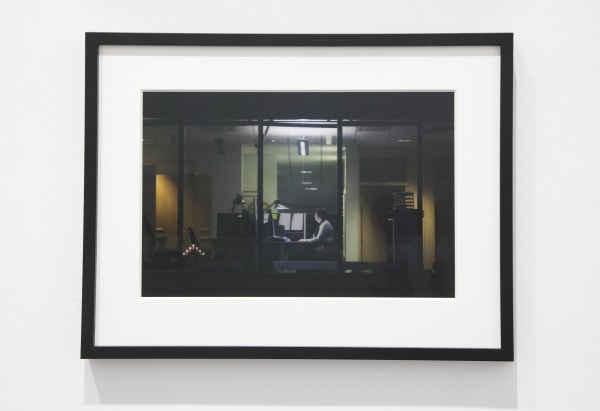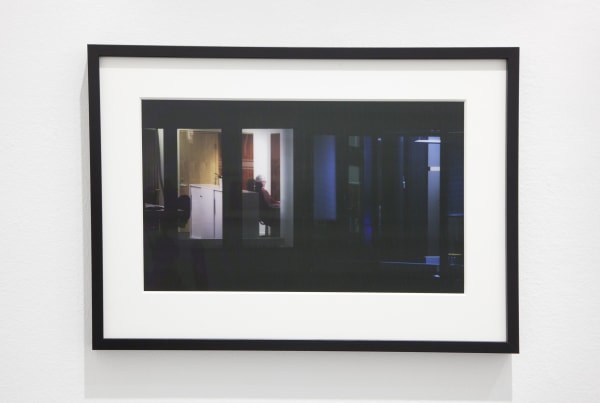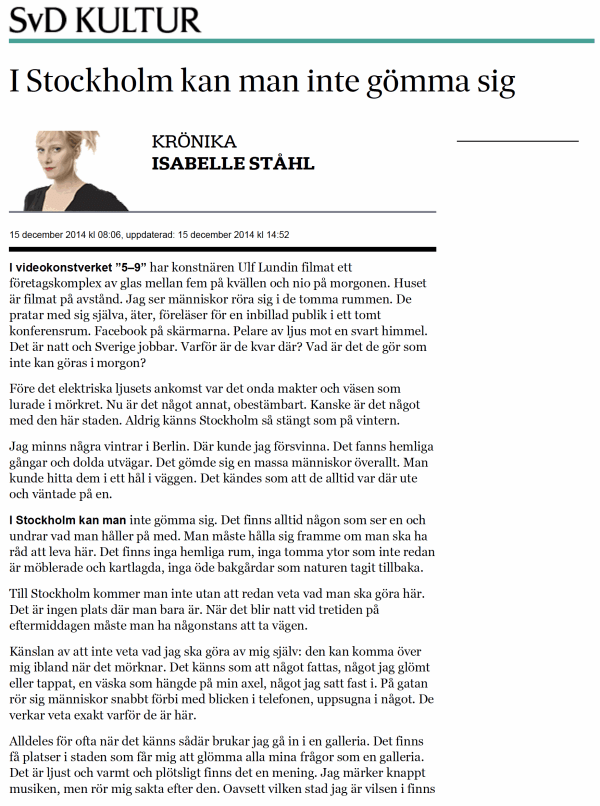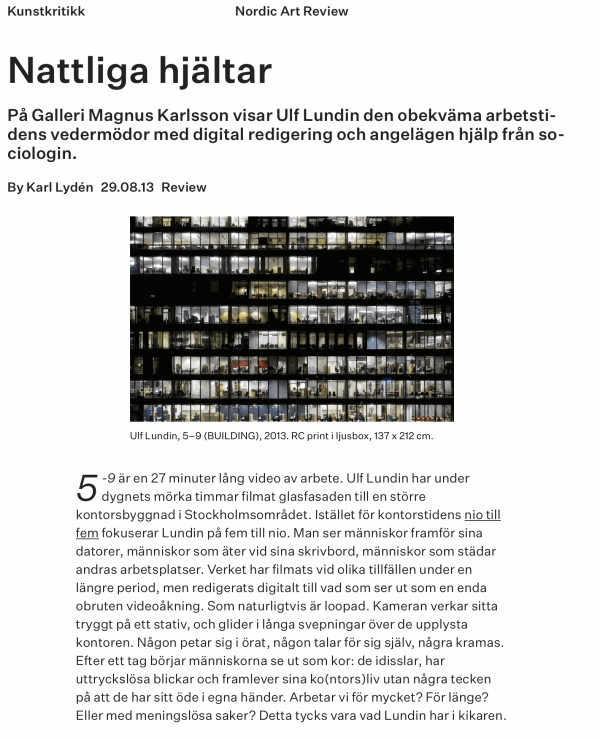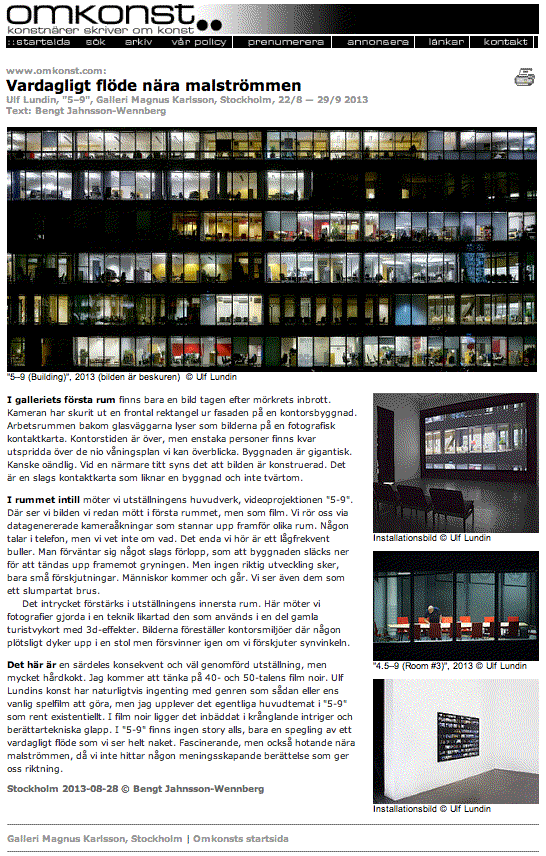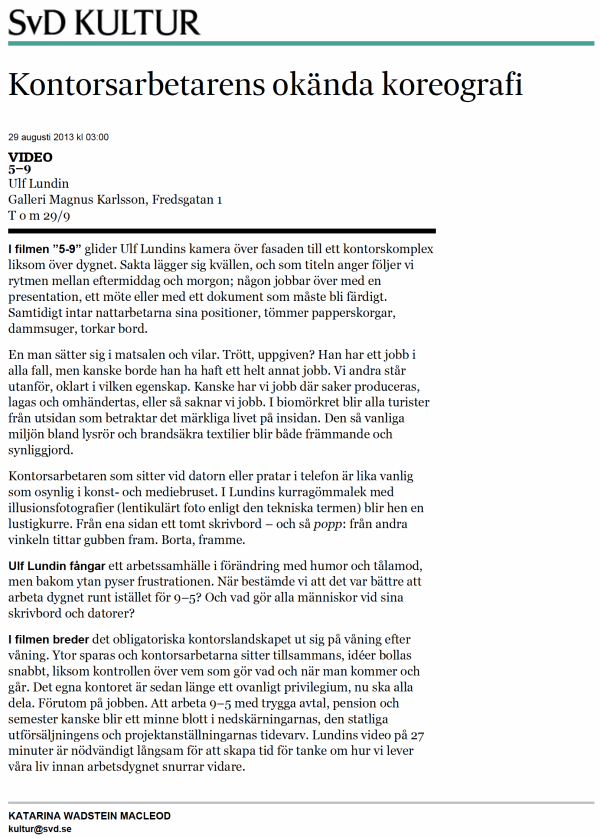Ulf Lundin | 5-9
(Scroll down for Swedish version)
Galleri Magnus Karlsson is pleased to present Ulf Lundin’s sixth solo exhibition in the gallery. The exhibition 5–9 presents video, photography and lenticular prints.
The main work in the exhibition is the video 5–9, that will be presented as a large format projection in the central room of the gallery. In the video we follow the everyday activities in a office building in the Stockholm area. It is shot in secret from a distance during dark hours. Lundin has gathered material for several weeks and it has been edited digitally so that the result is a 27 minutes long continuous dolly shot. Things that happen simultaneously in the video could actually be moments of entirely separate occasions with months apart. The result is a condensed reality where time and space has been manipulated. Lundin is not particularly interested in the office workers that are portrayed in 5–9, they rather represent all of us and our gaze is turned towards ourselves. How do we choose to live our lives?
Roland Paulsen, author of the book Arbetssamhället: Hur arbetet överlevde teknologin (The society of labor: How labor survived technology) and Doctor of Sociology (PhD), has written an essay for the exhibition.
--
Sweden is at work. In the winter it gets dark by four, just as the luckiest souls can leave the office. Some remain behind. Shafts of light soar towards a black sky. What goes on in these stranded spaceships? What kind of life vibrates in the myriad of gleaming windows?
At a distance it looks beautiful. An unfathomable conglomeration of life stories, far too vast for us to comprehend even a fraction. We zoom in. A man is lecturing in the conference room. He gestures and looks serious. Perhaps he is nervous. Perhaps he is imagining that a boss or other important person is scrutinising him. He must be imagining something. Because he’s alone. The conference room is empty. Next to him, in a parallel universe, two men are sitting staring at huge screens. The blue light shines on them. They are in another world. Higher up, a person is detained by a mobile phone. And over there a man and a woman are talking about something.
Perhaps it is not a coincidence that there are no web designers, copywriters, auditors or key accountant desk managers in children’s books. In the child's world, working life consists of bricklayers, farmers and nurses. People who help others, people whose work is utterly concrete and meaningful, people whose work has a distinct beginning and end.
As the children grow up, they learn that work is something different.
This learning does not start at school, it starts at home. To fit into the working community, the child’s spontaneity and liveliness must be tamed early on. The first adaptation to work is usually related to noise. The child must learn to be quiet on command. It is also vital that the child learns early in life to eat and sleep at command. This is largely what parenthood is about. In school, it becomes more crucial to sit still on command, to only talk when talking is allowed, to read, count, run, sing, create according to the teacher’s instructions. A child who learns all this is well-prepared for work.
Naturally, it is a long and hard fight to teach the spirited little creature all these things. But the child eventually gives in. It becomes pliable, easy to manage, clever and enthusiastic. It is not uncommon that the child begins seeking external restrictions. Without these restrictions the child feels worried. Sometimes, it can even create its own restrictions. Once the long working life is over and the child comes out the other side, as a pensioner, it often doesn’t know what to do with itself. The world that initially lay open and full of potential is now closed. The child nervously seeks out bright rooms where people do carpentry and sewing – almost like work, but not quite. It sedates itself with TV and various substances. After lifelong subordination to the will of others it is virtually impossible to rediscover free will.
In this long process – which we call life – the notion of work changes radically. Although it is seldom perceived in this way, the time in the office feels relatively safe. One is “working”. One does what one is told. This behaviour is accepted. But is it work? Cleaners move around here and there, carefully separated from the mind-workers they are supposed to clean up after. They are working. Their work is tangible. They are also aware that they are working. They would never dream of identifying themselves with their work. But what actually takes place on these screens around us? What is the blue light that shines into the night? What is said in those meetings? What is that presentation about?
Perhaps we are wise not to think too much about it. After all, if we have a job we should be happy. And if we have a job with an ergonomic office chair and free coffee, we are among the privileged.
There was a time when work was something that was sold by one party to another. That was before. Today, work is a gift, something employers give to the work-thirsting people. It is a beautiful gift. Work gives meaning to life, they say.
And yet, it is such a hard concept to grasp. What is the product? What is the service? Is it needed? What would happen if it didn’t exist?
It doesn’t matter. We have to work, or we don’t get any wages. We can’t afford not to work. Even though we get richer and richer every year. We’ve ensured this by basing our economy on growth. But this growth has no real value if it cannot be distributed. And how do we distribute it? With work. With wages, tax on wages, and a bit of tax on the consumption that work generates. That is the main purpose of work. And it is evident in how we speak of work. We don’t work to “generate growth”. Growth is generated by other things. But we want growth. Growth is good, because growth creates jobs. Jobs that could just as well be kept back, but which are given to us, as an act of benevolence, so that we can take part in working life, be a part of the community, be included in the overall context.
It’s time to leave now, perhaps we’ll make it to the bus at 5.34 pm if we take the shortcut through the snow again. In the canteen the cleaner sits down on a chair, he looks tired and devastated. We take forbidden pleasure in at least not being in his shoes. We should be grateful, after all, there are people who are far worse off. And tonight there’s a new episode of that TV series. For a short while, we can look at the cosy lighting and the Christmas decorations without fear, with warmth, almost like when we were children. We do our best – for the home, for our holidays, for the kids. The fantasy that we are all updated versions of bricklayers, nurses and farmers is comforting. Perhaps there is some meaning to that job, even if it is hard to see? Perhaps we are living inside a large, luminous ant hill where all the fragments of labour, even those we experience to be the most pointless, together form a magnificent whole? Perhaps all this is needed for the airplanes to fly, the medicine to work and the tap water to flow?
Or perhaps not.
Roland Paulsen, 2013
Translation: Gabriella Berggren
--
Galleri Magnus Karlsson har glädjen att presentera Ulf Lundins sjätte separatutställning på galleriet. I 5–9 presenteras video, fotografi och lentikulära flipbilder.
Huvudverket i utställningen är videon 5–9, som kommer att visas i stort format i galleriets centrala rum. Där får vi följa det vardagliga arbetet på ett kontor i Stockholmsområdet.Verket är filmat på avstånd vid upprepade tillfällen under dygnets mörka timmar. Råmaterialet har sedan redigerats digitalt till en 27 minuter obruten kameraåkning. Det som där sker samtidigt kan i själva verket ha ägt rum vid helt skilda tillfällen med månaders mellanrum. Resultatet är en komprimerad vardaglighet där tid och rum manipulerats. Ulf Lundin är inte ute efter att porträttera kontorsarbetarna som skildras i 5–9, utan blicken vänds tillbaka mot oss alla. – Hur lever vi våra liv?
Roland Paulsen, författare till boken Arbetssamhället och doktor i sociologi, har skrivit en text till utställningen.
--
Sverige jobbar. Vintertid mörknar det redan vid fyra, lagom till att de lyckligaste själarna kan lämna kontoret. Vissa sitter kvar. Ljuspelare skjuter upp mot en svart himmel. Vad händer i dessa strandade rymdskepp? Vad är det för liv som vibrerar i myriaden av fönsterblänk?
På avstånd ter det sig vackert. En ofattbar förening av livsberättelser, alldeles för stor för att ens bråkdelen ska förstås. Vi zoomar in. En man föreläser i mötesrummet. Han gestikulerar och ser allvarlig ut. Kanske är han nervös. Kanske föreställer han sig hur en chef eller någon annan viktig person granskar honom. Något måste han i alla fall föreställa sig. För han är ensam. Mötesrummet är tomt. Bredvid, i en parallell verklighet, sitter två män och stirrar in i stora skärmar. Det blå ljuset slår emot dem. De är i en annan värld. Högre upp har en person fastnat i mobiltelefonen. Och där borta talar en man och en kvinna om något.
Kanske är det inte en slump att barnböckerna saknar webutvecklare, copywriters, revisorer och key accountant desk managers. I barnens värld utgörs arbetslivet av murare, bönder och sjuksköterskor. Människor som hjälper andra, människor vars arbete är ytterst konkret och betydelsefullt, människor vars arbete har tydlig början och slut.
När barnen växer upp lär de sig att arbetet är något annat.
Inlärningsprocessen börjar inte i skolan, den börjar i hemmet. För att platsa in i arbetssamhället måste barnets spontanitet och livlighet tidigt tämjas. Den första arbetsanpassningen är oftast relaterad till ljud. Barnet måste lära sig att vara tyst på given order. Det är också viktigt att barnet tidigt lär sig äta och sova på given order. Detta är till stor del vad föräldraskapet kretsar kring. I skolan blir det viktigare att sitta still på given order, att bara tala när så tillåts, att läsa, räkna, springa, sjunga, skapa enligt lärarens instruktioner. Ett barn som lär sig allt detta är väl förberett för arbetet.
Det är naturligtvis en lång och hård kamp att lära den ettriga lilla varelsen alla dessa saker. Men till slut mjuknar barnet. Det blir formbart, enkelt att ha att göra med, duktigt och entusiastiskt. Inte alltför sällan händer det att barnet börjar söka sig till externa tvång. Om dessa tvång inte finns blir barnet oroligt. Ibland kan det till och med skapa sina egna tvång. När så det långa arbetslivet är över och barnet kommer ut på andra sidan, som pensionär, vet det många gånger inte vad det ska ta sig till. Den värld som i början av livet låg så öppen och full av möjligheter är nu stängd. Barnet söker sig nervöst till upplysta rum där man snickrar och syr – nästan som i arbete, fast ändå inte. Det lugnar sig med teve och olika substansintag. Efter ett liv underordnat någon annans vilja blir det närmast omöjligt att hitta tillbaka till den egna viljan.
I den här långa processen – det vi kallar livet – ändras bilden av arbete radikalt. Trots att det sällan upplevs så är tiden på kontoret relativt trygg. Man är ”i arbete”. Man gör som man blir tillsagd. Beteendet accepteras. Men arbetar man? Här och där går städare runt, väl åtskilda från de hjärnarbetare de ska hålla undan efter. De arbetar. Deras arbete syns. De är också medvetna om att de arbetar. De skulle aldrig komma på tanken att identifiera sig med sina jobb. Men vad är det egentligen som sker på dessa skärmar runt om? Vad är det för blått ljus som strålar ut i natten? Vad är det som sägs på dessa möten? Vad handlar presentation om?
Kanske gör vi bäst i att inte tänka alltför mycket på det. Har man jobb får man ju ändå vara glad. Har man dessutom ett jobb med ergonomisk kontorsstol och fri tillgång till kaffe, då tillhör man de privilegierade.
Det fanns en tid då arbete var något som såldes från en part till en annan. Det var förr. I dag är arbetet en gåva, något som arbetsgivare ger till det arbetstörstande folket. Det är en vacker gåva. Arbetet ger livet mening, sägs det.
Ändå är det så svårt att få grepp om. Vilken är produkten? Vilken är tjänsten? Behövs den? Vad skulle hända om den inte fanns?
Det spelar ingen roll. Vi måste arbeta, för annars får vi ingen lön. Vi har inte råd att inte arbeta. Vi blir visserligen rikare och rikare för varje år. Det har vi sett till genom att bygga vår ekonomi på tillväxt. Men tillväxten har inget större värde om den inte kan fördelas. Och hur fördelar vi den? Genom arbete. Genom lön, skatt på lön, och en smula skatt på den konsumtion som arbetet genererar. Detta är arbetets huvudfunktion. Och det hörs i hur vi talar om arbete. Vi arbetar inte för att ”få fart på tillväxten”. Det är annat som skapar tillväxt. Men vi vill ha tillväxt. Tillväxt är bra, för tillväxt skapar jobb. Jobb som likagärna skulle kunna hållas tillbaka, men som ges oss, i en akt av välvilja, för att vi ska kunna ta del av arbetslivet, bli en del av gemenskapen, ingå i det allt överordnade sammanhanget.
Det är dags att gå nu, kanske hinner vi med 17.34-bussen om vi genar genom snön igen. I matsalen sätter sig städaren på en stol, han ser trött och bedrövad ut. Vi känner otillåten tillfredsställelse över att åtminstone inte ha det som han. Man ska vara tacksam ändå, det finns andra som har det värre. Och ikväll är det ju nytt avsnitt av den där teveserien. För en kort stund kan vi se trivselljusen och adventsstjärnorna utan skräck, med värme, nästan som i barndom. Vi gör vårt bästa – för bostaden, för semestern, för barnen. Fantasin om att vi alla är uppdaterade varianter av murare, sköterskor och bönder tröstar oss. Kanske finns det, trots att den är så svår att se, ändå någon mening i det där jobbet? Kanske lever vi i en stor, lysande myrstack där alla arbetsfragment, till och med de som vi upplever som mest meningslösa, tillsammans bildar en magnifik helhet? Kanske måste allt detta till för att flygplanen ska flyga, medicinen fungera och kranvattnet rinna?
Kanske inte.
Roland Paulsen, 2013







